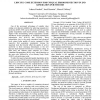Free Online Productivity Tools
i2Speak
i2Symbol
i2OCR
iTex2Img
iWeb2Print
iWeb2Shot
i2Type
iPdf2Split
iPdf2Merge
i2Bopomofo
i2Arabic
i2Style
i2Image
i2PDF
iLatex2Rtf
Sci2ools
145
click to vote
ICMCS
2010
IEEE
2010
IEEE
LDPC FEC code extension for unequal error protection in 2nd generation DVB systems
One of the envisioned advantages of scalable video coding is its inherent suitability for achieving unequal error protection (UEP). UEP can be effectively used for graceful quality degradation under harsh network conditions. The Digital Video Broadcasting (DVB) organization recently introduced second generations of broadcast transmission technologies like DVB-T2 and DVB-S2. These technologies, due to the newly introduced and advanced tools, ensure better quality of service compared to their respective first generation counterparts. Among the important tools that directly affect the quality of service positively in these emerging technologies is the new physical layer-chained forward error correction coding. In both cases, the chained codes comprise of a BoseChaudhuri-Hocquenghem (BCH) code, which functions as the outer code, followed by a Low-Density Parity Check (LDPC) code as the inner code. To allow for improved graceful quality degradation in the second generation DVB broadcast te...
| Added | 26 Jan 2011 |
| Updated | 26 Jan 2011 |
| Type | Journal |
| Year | 2010 |
| Where | ICMCS |
| Authors | Lukasz Kondrad, Imed Bouazizi, Moncef Gabbouj |
Comments (0)

